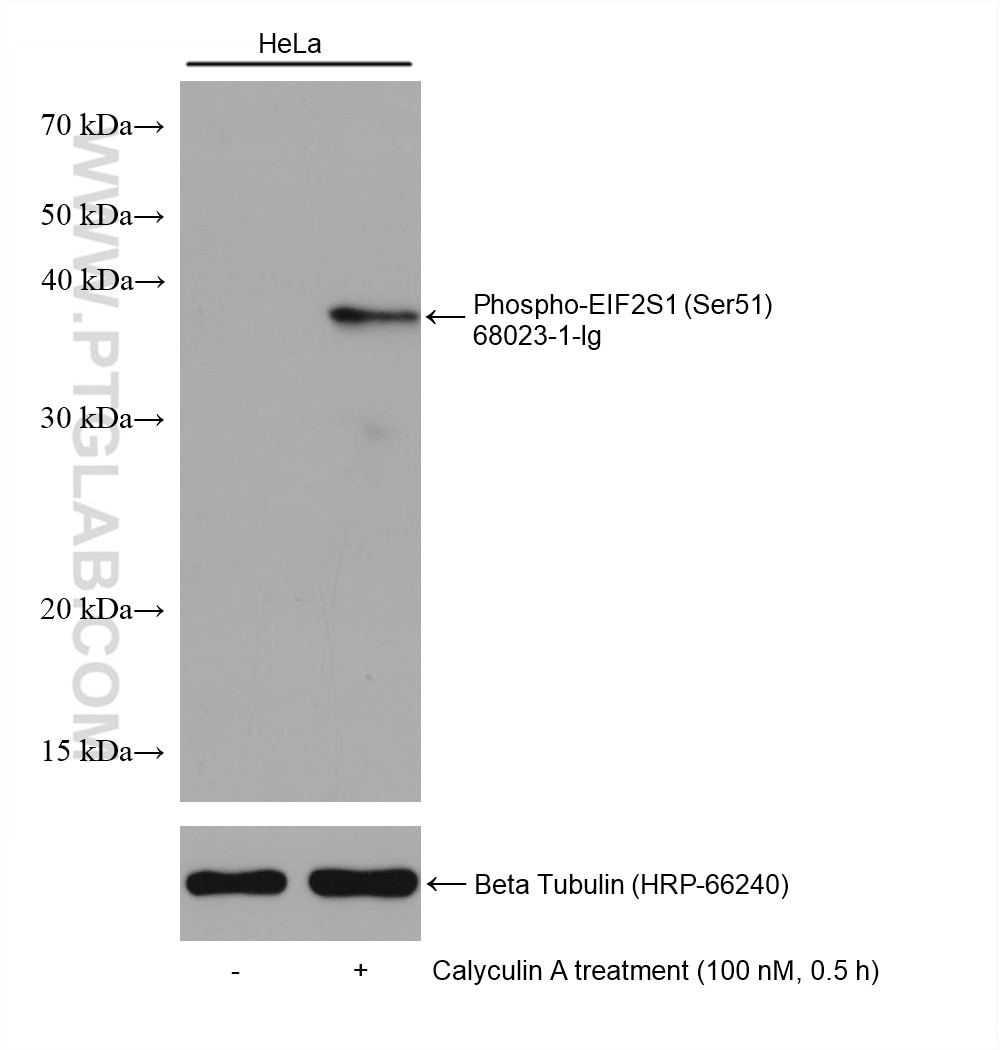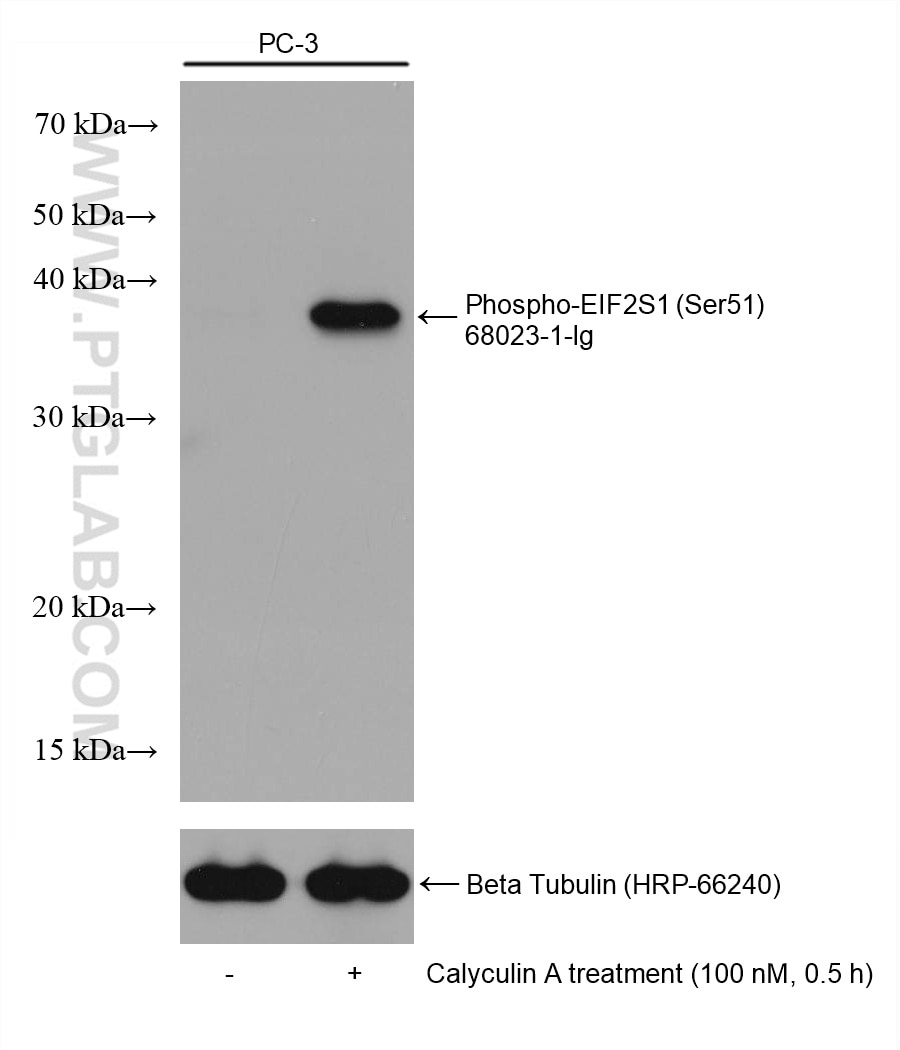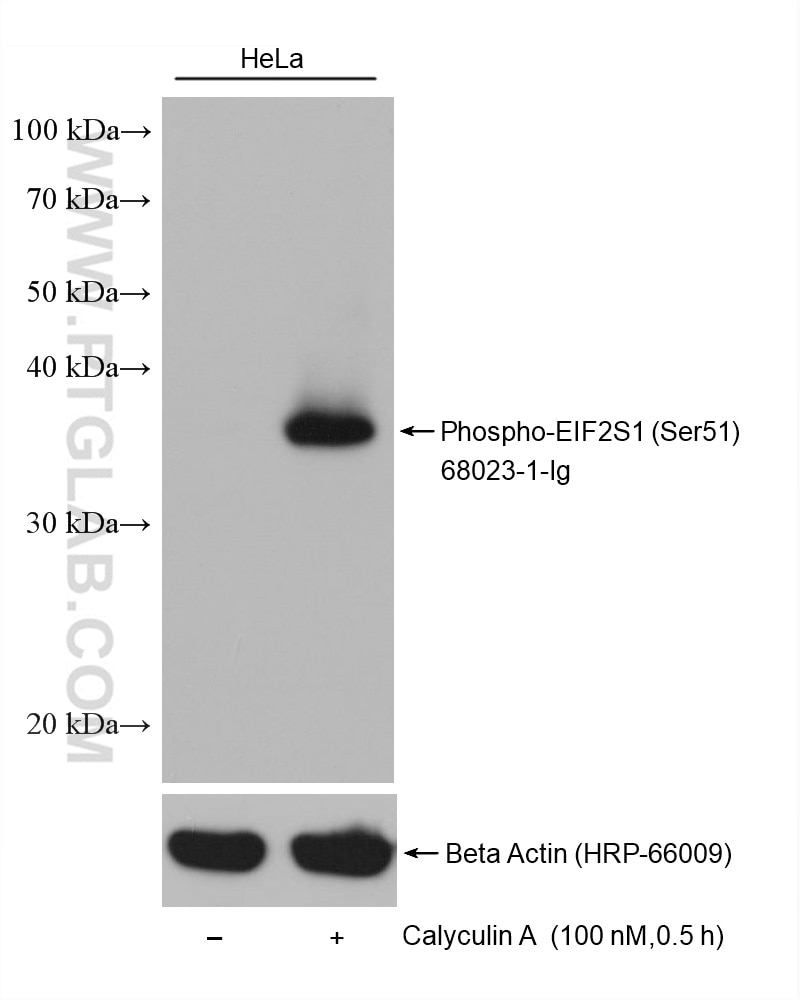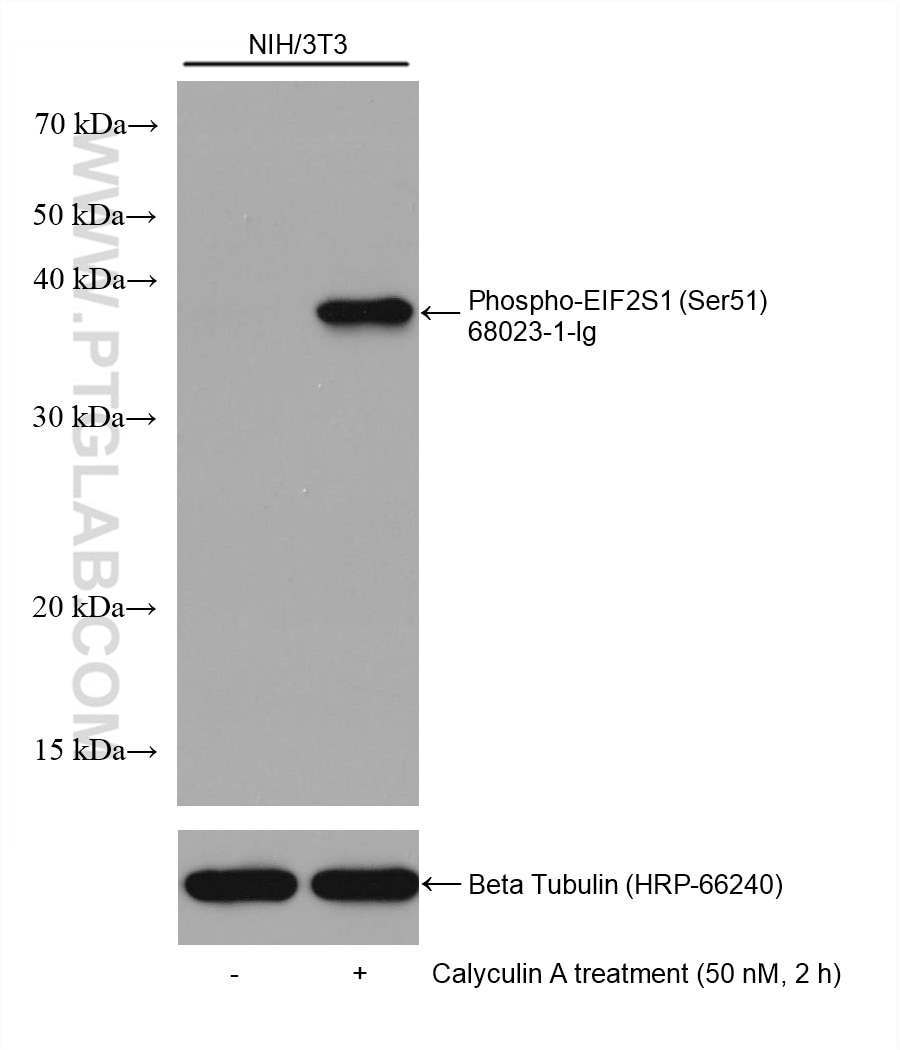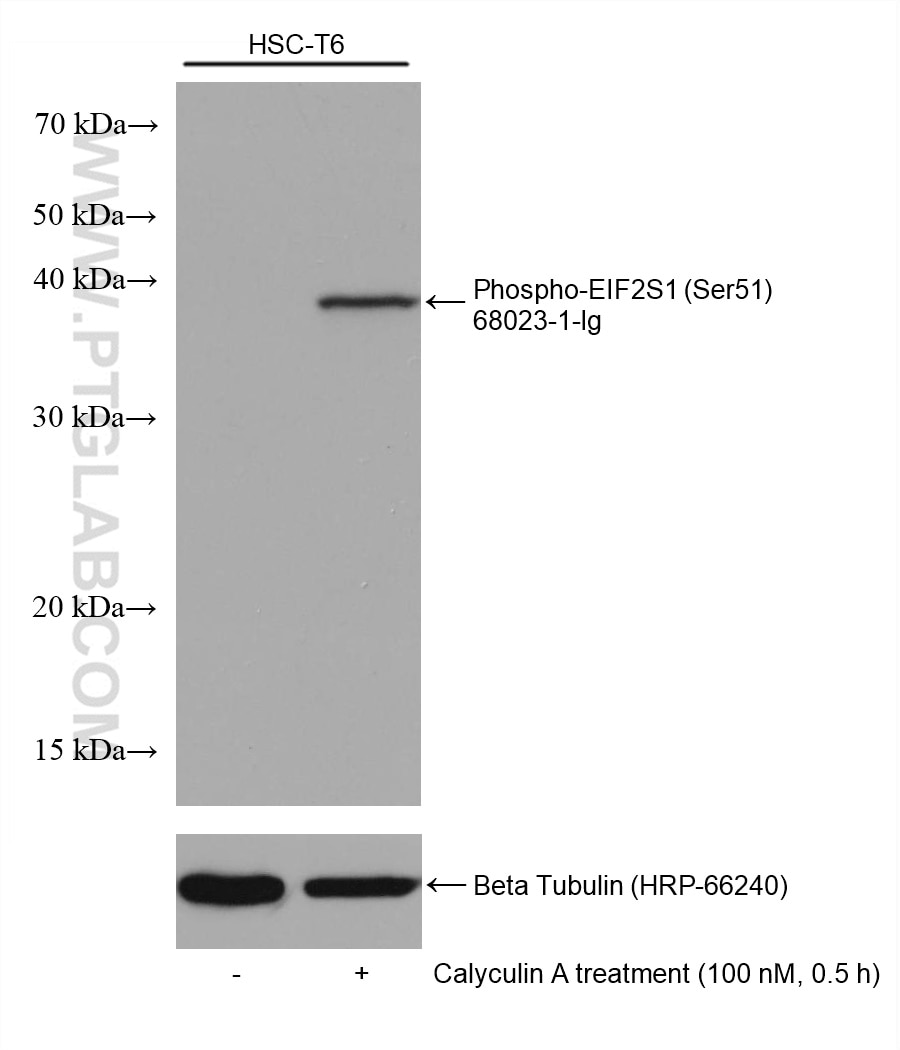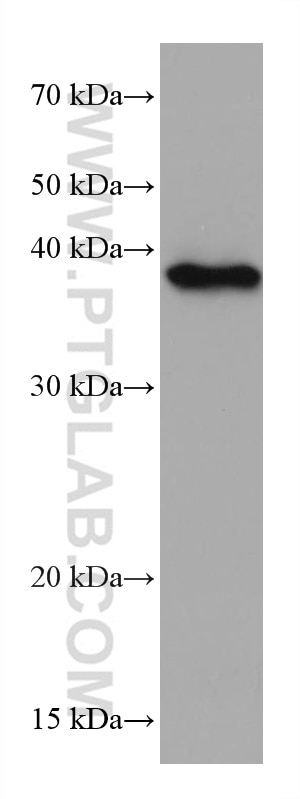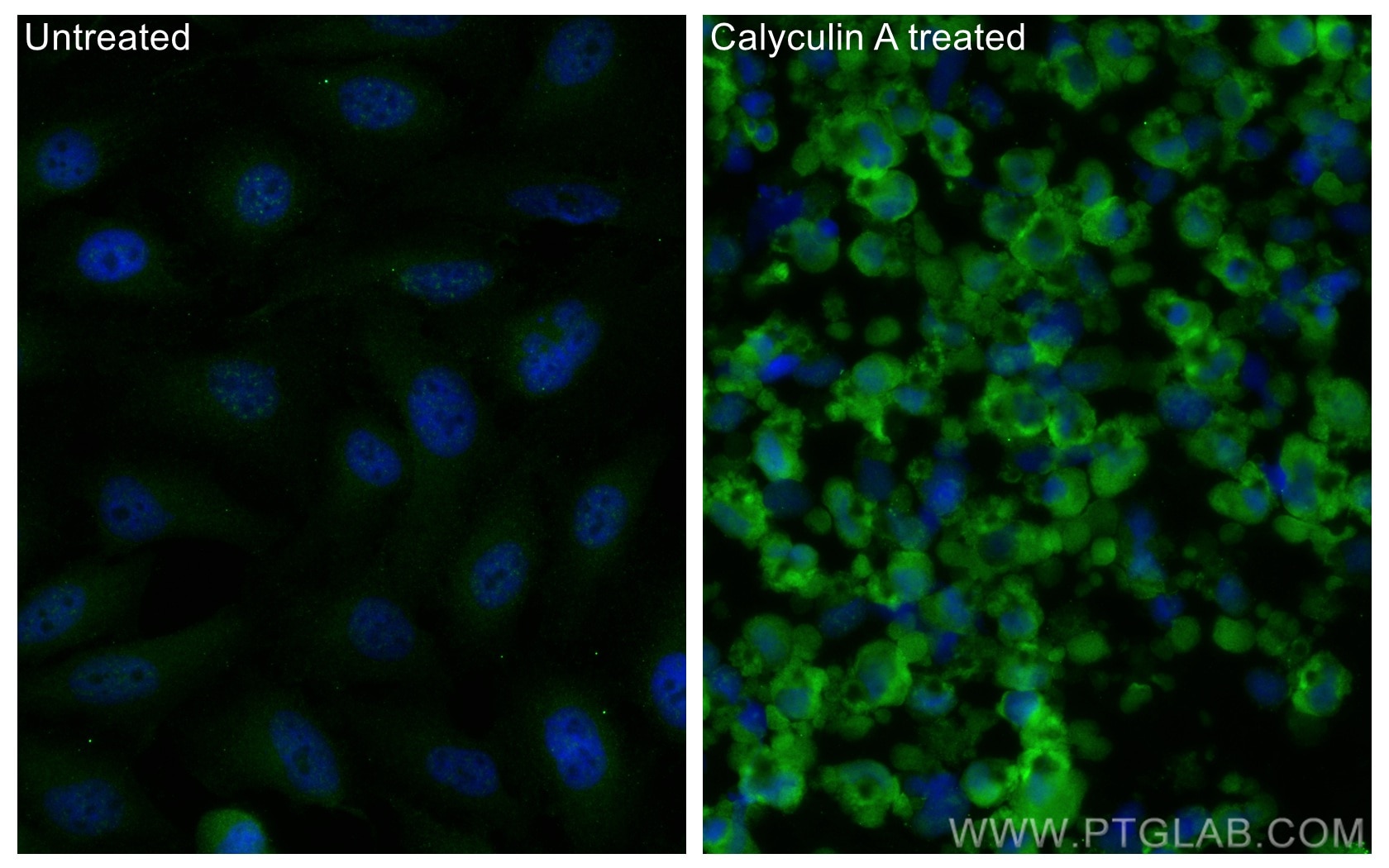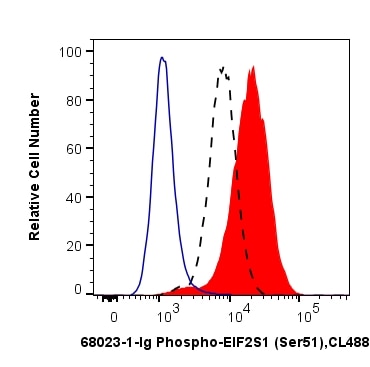Tested Applications
| Positive WB detected in | PC-3 cells, HeLa cells, Calyculin A treated HEK-293 cells, NIH/3T3 cells, HSC-T6 cells, Calyculin A treated HeLa cells, Calyculin A treated PC-3 cells, Calyculin A treated NIH/3T3 cells, Calyculin A treated HSC-T6 cells |
| Positive IF/ICC detected in | Calyculin A treated HeLa cells |
| Positive FC (Intra) detected in | Calyculin A treated PC-3 cells |
Recommended dilution
| Application | Dilution |
|---|---|
| Western Blot (WB) | WB : 1:5000-1:50000 |
| Immunofluorescence (IF)/ICC | IF/ICC : 1:400-1:1600 |
| Flow Cytometry (FC) (INTRA) | FC (INTRA) : 0.50 ug per 10^6 cells in a 100 µl suspension |
| It is recommended that this reagent should be titrated in each testing system to obtain optimal results. | |
| Sample-dependent, Check data in validation data gallery. | |
Published Applications
| WB | See 10 publications below |
| IF | See 1 publications below |
Product Information
68023-1-Ig targets Phospho-EIF2S1 (Ser51) in WB, IF/ICC, FC (Intra), ELISA applications and shows reactivity with human, mouse, rat samples.
| Tested Reactivity | human, mouse, rat |
| Cited Reactivity | human, mouse |
| Host / Isotype | Mouse / IgG1 |
| Class | Monoclonal |
| Type | Antibody |
| Immunogen |
fusion protein Predict reactive species |
| Full Name | eukaryotic translation initiation factor 2, subunit 1 alpha, 35kDa |
| Calculated Molecular Weight | 36 kDa |
| Observed Molecular Weight | 36 kDa |
| GenBank Accession Number | NM_004094 |
| Gene Symbol | EIF2S1 |
| Gene ID (NCBI) | 1965 |
| RRID | AB_2918767 |
| Conjugate | Unconjugated |
| Form | Liquid |
| Purification Method | Protein A purification |
| UNIPROT ID | P05198 |
| Storage Buffer | PBS with 0.02% sodium azide and 50% glycerol, pH 7.3. |
| Storage Conditions | Store at -20°C. Stable for one year after shipment. Aliquoting is unnecessary for -20oC storage. 20ul sizes contain 0.1% BSA. |
Background Information
EIF2S1 is one subunit of the translation initiation factor EIF2, which catalyzes the first regulated step of protein synthesis initiation, promoting the binding of the initiator tRNA to 40S ribosomal subunits. This complex binds to a 40S ribosomal subunit, followed by mRNA binding to form a 43S preinitiation complex. Junction of the 60S ribosomal subunit to form the 80S initiation complex is preceded by hydrolysis of the GTP bound to eIF-2 and release of an eIF-2-GDP binary complex. In order for eIF-2 to recycle and catalyze another round of initiation, the GDP bound to eIF-2 must exchange with GTP by way of a reaction catalyzed by eIF-2B. This phosphorylation stabilizes the eIF2-GDP-eIF2B complex and inhibits the turnover of eIF2B. Induction of PKR by IFN-γ and TNF-α induces potent phosphorylation of eIF2α at Ser51.
Protocols
| Product Specific Protocols | |
|---|---|
| WB protocol for Phospho-EIF2S1 (Ser51) antibody 68023-1-Ig | Download protocol |
| IF protocol for Phospho-EIF2S1 (Ser51) antibody 68023-1-Ig | Download protocol |
| Standard Protocols | |
|---|---|
| Click here to view our Standard Protocols |
Publications
| Species | Application | Title |
|---|---|---|
Int Immunopharmacol TRx0237 induces apoptosis and enhances anti-PD-1 immunotherapeutic efficacy in anaplastic thyroid Cancer | ||
bioRxiv Mitosis exit followed by death in interphase prevents the development of polyploid giant cancer cells | ||
Cell Death Dis AURKA emerges as a vulnerable target for KEAP1-deficient non-small cell lung cancer by activation of asparagine synthesis | ||
J Transl Med The microtubule targeting agent ST-401 triggers cell death in interphase and prevents the formation of polyploid giant cancer cells | ||
Environ Pollut Copper exposure induces mitochondrial dysfunction and hepatotoxicity via the induction of oxidative stress and PERK/ATF4 -mediated endoplasmic reticulum stress | ||
Microbiol Res Berberine ameliorates vascular dysfunction by downregulating TMAO-endoplasmic reticulum stress pathway via gut microbiota in hypertension |
Reviews
The reviews below have been submitted by verified Proteintech customers who received an incentive for providing their feedback.
FH Alla (Verified Customer) (07-24-2025) | Very good antibody.Have good image,but was not ale to uploade it.
|
